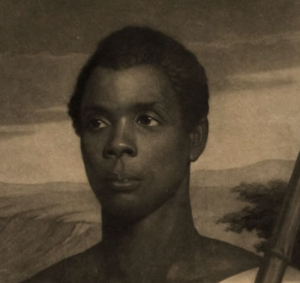
Sengbe Piehis
*Sengbe Piehis's birth is celebrated on this date, c. 1814. Also known as Joseph Cinqué, sometimes called Cinqué, he was a West African man of the Mende people who led a revolt of many Africans on the Spanish slave ship La Amistad.
Cinqué was born in what is now Sierra Leone. His exact date of birth remains unknown. He was a rice farmer and married with three children when he was captured illegally by African slave traders in 1839 and sold to Pedro Blanco, a Spanish slave trader. He was imprisoned on the Portuguese slave ship Tecora in violation of treaties prohibiting the international slave trade. Cinqué was taken to Havana, Cuba, where he was sold with 110 others to Spaniards José Ruiz and Pedro Montez.
The Spaniards arranged to transport the captives on the coastal schooner Amistad to sell them as slaves at ports along the coast in Cuba for work at sugar plantations. On June 30, Cinqué led a revolt, killing the ship's captain and cook; two slaves also died, and two sailors escaped. The Africans took Ruiz and Montez as prisoners, the merchants who had purchased them, and demanded they direct the ship back to Sierra Leone.
Instead, at night, they directed the navigator in the opposite direction toward the Americas. After about two months, Amistad reached United States waters near Long Island, New York. Members of the USS Washington boarded the vessel. When they discovered what had happened (according to the Spaniards), they charged the Africans with mutiny and murder. The ship and the Mende were taken to New Haven, Connecticut, to await trial. Interpreters from Mende to English were found, who enabled the Africans to tell their stories to attorneys and the court. Cinqué served as the group's informal representative.
After the ship was taken into custody by the United States Revenue Cutter Service, Cinqué and his fellow Africans were eventually tried for mutiny and killing officers in a case known as United States v. The Amistad. This reached the U.S. Supreme Court, where in March 1841, the Supreme Court ruled that the Africans revolted to regain their freedom after being kidnapped and sold illegally. Americans helped raise money for the return of 35 of the survivors to Sierra Leone.
Cinqué and the other Mende reached their homeland in 1842. In Sierra Leone, Cinqué encountered civil war. He and his company maintained contact with the local mission for a while, but Cinqué left to trade along the coast. Little is known of his later life, and rumors circulated. Some maintained that he had moved to Jamaica. Others held that he had become a merchant or a chief who died in 1879.